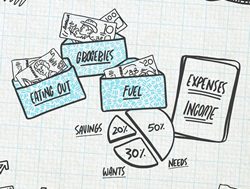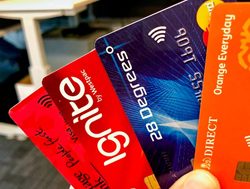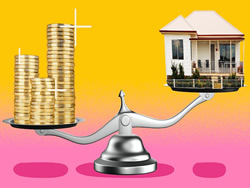Laura Tien* says borrowing money generally isn’t a “no strings attached” deal.
 Whether you’re borrowing money to pay for an unexpected bill or to buy your first home, there are a few things you should know beforehand.
Whether you’re borrowing money to pay for an unexpected bill or to buy your first home, there are a few things you should know beforehand.
Borrowing involves using credit, which is the ability to receive money based on the assumption you’ll pay it off later on.
Of course, borrowing money generally isn’t a “no strings attached” deal.
You’ll usually need to pay some combination of fees, charges and interest rates on top of the amount you initially borrowed.
And if you don’t keep up with your payments, these costs can land you in hot water.
As such, here are the questions you should ask before borrowing money.
What type of credit is right for you?
There are now a ton of different types of credit that Aussies can choose from.
There are credit cards, personal loans, car loans, home loans, bank overdrafts, and payday loans, just to name a few.
The type of credit you utilise is more obvious in some situations, such as using a home loan to buy property.
In other situations, such as when buying a car, you might benefit from weighing up the differences between a car loan and a personal loan.
What are the fees, charges and interest rates?
Part of understanding what it takes to borrow money is understanding the fees, charges and interest rates associated with your loan.
In many cases, you’ll have to pay fees and charges.
These are generally set amounts, such as establishment fees, account fees and late payment fees.
You’ll typically also have to pay interest.
Interest rates are a percentage of the loan that you have to pay on top of the loan amount.
Typically, as you pay off more of your loan, you’ll pay less and less interest.
You’ll usually be charged interest monthly, quarterly or yearly.
Fees, charges and interest rates might also affect what type of credit makes more sense for your situation.
For example, maybe you’ve been eyeing a new television to replace the one in your living room that barely works anymore.
Because it’s such a massive purchase, you’re considering taking out your credit card to make the payment.
That’s only until you see the Afterpay option online.
In the case of a credit card, you’ll have to pay interest if you don’t pay the closing amount in full by the due date.
You might also have to pay annual fees.
On the flip side, Afterpay doesn’t charge interest.
Having said that, you’d have to consider late fees, and you’re limited to paying off your purchase in four fortnights.
How much can you afford to borrow?
Before you borrow money, you need to figure out how much money you can actually afford to borrow, or if you can afford it at all.
You’ll need to consider interest rates, fees and charges, and other product-specific features, then make sure you’re making enough money to pay it all off.
For example, if you take out a personal loan of $20,000 to buy a new car at an interest rate of 13.9 per cent p.a.and on a loan term of five years, you’ll have to pay back $464 every month.
If you find you don’t usually have that amount leftover after your pay each month, you might need to reconsider.
It’s also worth considering you’ll be paying a lot more than $20,000 in the long run.
At a 13.9 p.a. interest rate over five years, you’ll end up paying $27,860.
This works out to be $7,860 just in interest.
You’ll want to ask yourself whether it’s worth taking out a loan to buy the car now.
It might be a better option to opt for a cheaper car or save up and buy a car outright.
What does your credit health look like?
Another crucial thing to consider when borrowing money is your credit health.
In Australia, this includes a credit report that details your credit history and your credit score.
Essentially, a higher credit score reflects a better capacity to borrow and pay back money.
Your credit health is influenced by factors such as paying bills on time, paying off credit cards and debt on time, having a low balance on your credit card, etc.
Having a poor credit report will make it more difficult for you to borrow money.
Most of the time, your credit history will show when you’ve borrowed money from a credit provider.
However, at the moment, buy-now-pay-later options such as Afterpay aren’t considered loans the same way a credit card is.
In saying that, Afterpay can let credit reporting agencies know if you’re late or default on payments.
Try not to fall into the trap of using buy-now-pay-later options if you’re not prepared to pay everything back on time.
It can still affect your credit health and future borrowing power.
Is your credit provider licensed?
One of the most important things to consider when borrowing money is whether your credit provider has a licence.
Watch out for companies that are operating illegally in Australia.
You can use ASIC Connect’s Professional Registers to check.
Likewise, beware of loan scams that contact you out of the blue through phone or email.
While these tips should help you if you’re on a quest to borrow money, it might be a good idea to speak to an expert so you make the right choice for your personal situation.
*Laura Tien has been creating articles in the digital world for over seven years. In the past couple of years, she has focused on writing about personal finance and real estate.
This article first appeared at spaceship.com.au.










